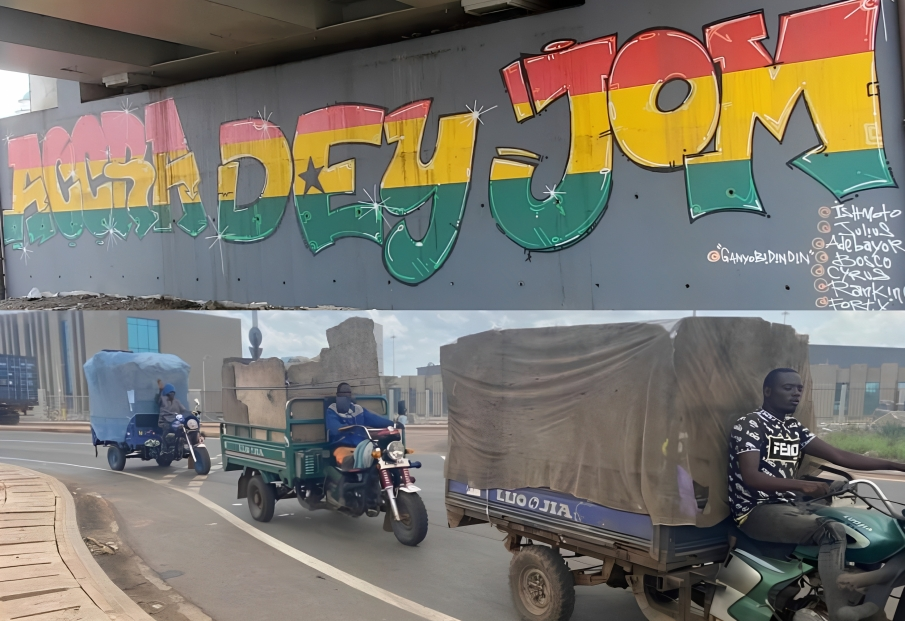Accra Dey Jom: Where Hustle Meets Survival in the City of Dreams

GH News Media

By Sabaha Abonyin
If you’ve ever been called a JJC in Accra, you’ll understand that feeling — half embarrassment, half adventure. JJC, to wit, Johnny Just Come, a popular jargon on the streets of Ghana and featured as a single by the country’s self-acclaimed Dancehall King, Shatta Wale, is used to tag someone for their bizarre behaviour in a new setting.
Who am I? I’m just someone who wishes to see the beautiful places, the people, and their way of living in and around the corridors of my motherland.
Having lived most of my life at my “base” (a coded location to be disclosed later) until university caught up with me, I had to travel to the capital city to further my education.
Before setting off, I’d heard a lot of “stories” about the capital city and its way of living. “Accra dieℇ students set off early before the sunset; if not, they’d be found wanting in school.” So in my mind, life in Accra wasn’t child’s play.
The smell of kofi brokeman (roasted plantain) mixed with car fumes and the sound of trotro mates shouting their destinations was my welcome anthem to Accra. When I got off the bus at Neoplan Station, it felt like I’d landed inside a roller coaster.
Read Also: Ghana vs Comoros - Preview, H2H, Line-ups & Prediction
Flyovers here, underpasses there — my first real-life interchange. Witnessing how my eyes were inflamed with excitement, one passerby whispered, “Wait till you see Mahama’s Dubai at night, and you’ll be amazed.”
“But while at it, you’d better protect your belongings like a kangaroo does her newbies, or else they’ll kwashey you,” he cautioned.
Accra has always been fascinating and rich with opportunities. It is therefore not surprising that a person from my base would pack up and embark on a journey to look for greener pastures in the capital city, though at times these pastures become brownish.
It is a place where everything, almost everything, sells and is profitable. The garbage at my base is gold in the city, yes, gold in the city because it fetches people money in an unimaginable way. Unfortunately, I found this out in a bizarre way.
After a long ride to the city, sleep took over me the moment my body touched the mat and my mind entered the peaceful world, till I heard the sound poorrpii poorrpii.
Yes, the sound of a popular snack hawker, FanIce, as it’s called, woke me up from my bed, and with sleepy eyes, I posed a question to myself, “So who is selling FanIce at this ungodly hour?” The sound kept getting closer, so I decided to take a peek; for all you know, it might be something new in the capital city.
Read Also: John Cena beats AJ Styles in epic WWE Crown Jewel showdown
Only to meet the moving tricycle face-to-face with the peddler shouting his lungs out, “borla”, “borla”, “borla”, “borla car no aba” (trash, trash, trash, the trash car is in). Yep, your reaction is as good as mine. With my eyes almost popping out, all I could utter was… Ahhh.
As time goes by, so do the garbage collection business upgrades, with some using a megaphone to reach as many patrons of their services as possible.
What many might see as dirty work is seen in Accra as a golden opportunity. The “borla” business — the collection of waste — has quietly grown into one of the city’s most vibrant informal enterprises, offering surprising benefits to individuals and communities alike. provides employment for thousands of young people who might otherwise be unemployed.
From tricycle operators to recyclers and sorters at dump sites, the business creates an entire chain of livelihood for families across the capital. What used to be seen as low-status work has now become a source of dignity and daily bread for many.
Read Also: NYC sues TikTok, Facebook, Google & others for allegedly addicting children
The intriguing part of the business is that pricing lies entirely on the shoulders of the operator. Because there is no scale of measurement, the garbage is charged based on the pain felt when carrying the dustbin.
The least charge is five Ghana cedis, and even that at times comes with a plea so they don’t abandon your garbage.
What looks like trash to you is someone else’s daily bread. From collecting household waste to sorting bottles, plastics, and scrap metal, these hard-working folks have built a network that keeps the city alive.
Every bag of rubbish they collect could mean another meal, another school fee paid, another small victory in the daily Accra hustle.
What I love most is how the Borla trade teaches us that hustle has no hierarchy. Whether you’re in a suit behind a desk or pushing a tricycle under the hot sun, work is work. Everyone contributes to the heartbeat of the city.
Funny, right? But in Accra we dey, and everything, and I mean everything, is a business, and maybe, just maybe, I was just being JJC again.



